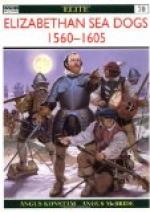In the sixteenth century both France and England were occupied with momentous things at home. France was torn with religious wars. Tudor England had much work to do before any effective English colonies could be planted. Oversea dominions are nothing without sufficient sea power, naval and mercantile, to win, to hold, and foster them. But Tudor England was gradually forming those naval and merchant services without which there could have been neither British Empire nor United States.
Henry VIII had faults which have been trumpeted about the world from his own day to ours. But of all English sovereigns he stands foremost as the monarch of the sea. Young, handsome, learned, exceedingly accomplished, gloriously strong in body and in mind, Henry mounted the throne in 1509 with the hearty good will of nearly all his subjects. Before England could become the mother country of an empire overseas, she had to shake off her medieval weaknesses, become a strongly unified modern state, and arm herself against any probable combination of hostile foreign states. Happily for herself and for her future colonists, Henry was richly endowed with strength and skill for his task. With one hand he welded England into political unity, crushing disruptive forces by the way. With the other he gradually built up a fleet the like of which the world had never seen. He had the advantage of being more independent of parliamentary supplies than any other sovereign. From his thrifty father he had inherited what was then an almost fabulous sum—nine million dollars in cash. From what his friends call the conversion, and his enemies the spoliation, of Church property in England he obtained many millions more. Moreover, the people as a whole always rallied to his call whenever he wanted other national resources for the national defence.
Henry’s unique distinction is that he effected the momentous change from an ancient to a modern fleet. This supreme achievement constitutes his real title to the lasting gratitude of English-speaking peoples. His first care when he came to the throne in 1509 was for the safety of the ‘Broade Ditch,’ as he called the English Channel. His last great act was to establish in 1546 ‘The Office of the Admiralty and Marine Affairs.’ During the thirty-seven years between his accession and the creation of this Navy Board the pregnant change was made.
‘King Henry loved a man.’ He had an unerring eye for choosing the right leaders. He delighted in everything to do with ships and shipping. He mixed freely with naval men and merchant skippers, visited the dockyards, promoted several improved types of vessels, and always befriended Fletcher of Rye, the shipwright who discovered the art of tacking and thereby revolutionized navigation. Nor was the King only a patron. He invented a new type of vessel himself and thoroughly mastered scientific gunnery. He was the first of national leaders to grasp the full significance of what could be done by broadsides fired from sailing ships against the mediaeval type of vessel that still depended more on oars than on sails.




